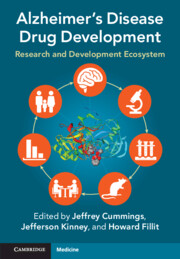Book contents
- Alzheimer’s Disease Drug Development
- Alzheimer’s Disease Drug Development
- Copyright page
- Dedication
- Contents
- Contributors
- Foreword
- Acknowledgments
- Section 1 Advancing Alzheimer’s Disease Therapies in a Collaborative Science Ecosystem
- Section 2 Non-clinical Assessment of Alzheimer’s Disease Candidate Drugs
- Section 3 Alzheimer’s Disease Clinical Trials
- 11 Phase 1 Trials in Alzheimer’s Disease Drug Development
- 12 The Importance of Phase 2 in Drug Development for Alzheimer’s Disease
- 13 Alzheimer’s Disease Drug Development in Pharmaceutical Companies
- 14 Trial Site Infrastructure and Management: Importance to Alzheimer’s Disease Drug Development
- 15 ATRI and ACTC: Academic Programs to Accelerate Alzheimer’s Disease Drug Development
- 16 The European Prevention of Alzheimer’s Disease Program: A Public–Private Partnership to Facilitate the Secondary Prevention of Alzheimer’s Disease Dementia
- 17 The Global Alzheimer’s Platform Foundation®: Delivering New Medicines Faster by Accelerating Clinical Trials
- 18 Clinical Trial Development in Frontotemporal Lobar Degeneration
- 19 Statistical Considerations in the Design and Analysis of Alzheimer’s Disease Clinical Trials
- 20 Alzheimer’s Disease Trial Recruitment and Diversifying Trial Populations
- 21 The Role of Online Registries in Accelerating Alzheimer’s Disease Drug Development
- 22 Data Safety Monitoring Boards in Alzheimer’s Disease Trials
- 23 Globalization of Alzheimer’s Disease Clinical Trials
- 24 The Use and Development of Clinical Measures of Alzheimer’s Disease Trials
- 25 Tele-Trials, Remote Monitoring, and Trial Technology for Alzheimer’s Disease Clinical Trials
- 26 Expanded Access and Compassionate Use in Alzheimer’s Disease Drug Development
- 27 The Role of the Contract Research Organization in Alzheimer’s Disease: The Vital Link in the Clinical Drug-Development Program
- 28 The Role of Regulatory Agencies in Alzheimer’s Disease Drug Development
- 29 Alzheimer’s Disease Clinical Trial Study Partners
- 30 From Trials to Practice: Are We Ready for a Disease-Modifying Treatment?
- 31 Best Practices for Clinical Trials during COVID-19
- Section 4 Imaging and Biomarker Development in Alzheimer’s Disease Drug Discovery
- Section 5 Academic Drug-Development Programs
- Section 6 Public–Private Partnerships in Alzheimer’s Disease Drug Development
- Section 7 Funding and Financing Alzheimer’s Disease Drug Development
- Index
- References
26 - Expanded Access and Compassionate Use in Alzheimer’s Disease Drug Development
from Section 3 - Alzheimer’s Disease Clinical Trials
Published online by Cambridge University Press: 03 March 2022
- Alzheimer’s Disease Drug Development
- Alzheimer’s Disease Drug Development
- Copyright page
- Dedication
- Contents
- Contributors
- Foreword
- Acknowledgments
- Section 1 Advancing Alzheimer’s Disease Therapies in a Collaborative Science Ecosystem
- Section 2 Non-clinical Assessment of Alzheimer’s Disease Candidate Drugs
- Section 3 Alzheimer’s Disease Clinical Trials
- 11 Phase 1 Trials in Alzheimer’s Disease Drug Development
- 12 The Importance of Phase 2 in Drug Development for Alzheimer’s Disease
- 13 Alzheimer’s Disease Drug Development in Pharmaceutical Companies
- 14 Trial Site Infrastructure and Management: Importance to Alzheimer’s Disease Drug Development
- 15 ATRI and ACTC: Academic Programs to Accelerate Alzheimer’s Disease Drug Development
- 16 The European Prevention of Alzheimer’s Disease Program: A Public–Private Partnership to Facilitate the Secondary Prevention of Alzheimer’s Disease Dementia
- 17 The Global Alzheimer’s Platform Foundation®: Delivering New Medicines Faster by Accelerating Clinical Trials
- 18 Clinical Trial Development in Frontotemporal Lobar Degeneration
- 19 Statistical Considerations in the Design and Analysis of Alzheimer’s Disease Clinical Trials
- 20 Alzheimer’s Disease Trial Recruitment and Diversifying Trial Populations
- 21 The Role of Online Registries in Accelerating Alzheimer’s Disease Drug Development
- 22 Data Safety Monitoring Boards in Alzheimer’s Disease Trials
- 23 Globalization of Alzheimer’s Disease Clinical Trials
- 24 The Use and Development of Clinical Measures of Alzheimer’s Disease Trials
- 25 Tele-Trials, Remote Monitoring, and Trial Technology for Alzheimer’s Disease Clinical Trials
- 26 Expanded Access and Compassionate Use in Alzheimer’s Disease Drug Development
- 27 The Role of the Contract Research Organization in Alzheimer’s Disease: The Vital Link in the Clinical Drug-Development Program
- 28 The Role of Regulatory Agencies in Alzheimer’s Disease Drug Development
- 29 Alzheimer’s Disease Clinical Trial Study Partners
- 30 From Trials to Practice: Are We Ready for a Disease-Modifying Treatment?
- 31 Best Practices for Clinical Trials during COVID-19
- Section 4 Imaging and Biomarker Development in Alzheimer’s Disease Drug Discovery
- Section 5 Academic Drug-Development Programs
- Section 6 Public–Private Partnerships in Alzheimer’s Disease Drug Development
- Section 7 Funding and Financing Alzheimer’s Disease Drug Development
- Index
- References
Summary
Expanded access and compassionate use refer to the use of an investigational new drug outside of a clinical trial to treat a patient with a serious or life-threatening disease who are not eligible or it is not feasible to participate in randomized, clinical trials. The Food and Drug Administration oversees the expanded-access program and provides guidance for the stakeholders. The expanded-access process provides a potential mechanism to facilitate Alzheimer’s disease (AD) drug development process and increase access to investigational new drugs for patients with AD.
Keywords
- Type
- Chapter
- Information
- Alzheimer's Disease Drug DevelopmentResearch and Development Ecosystem, pp. 301 - 308Publisher: Cambridge University PressPrint publication year: 2022

